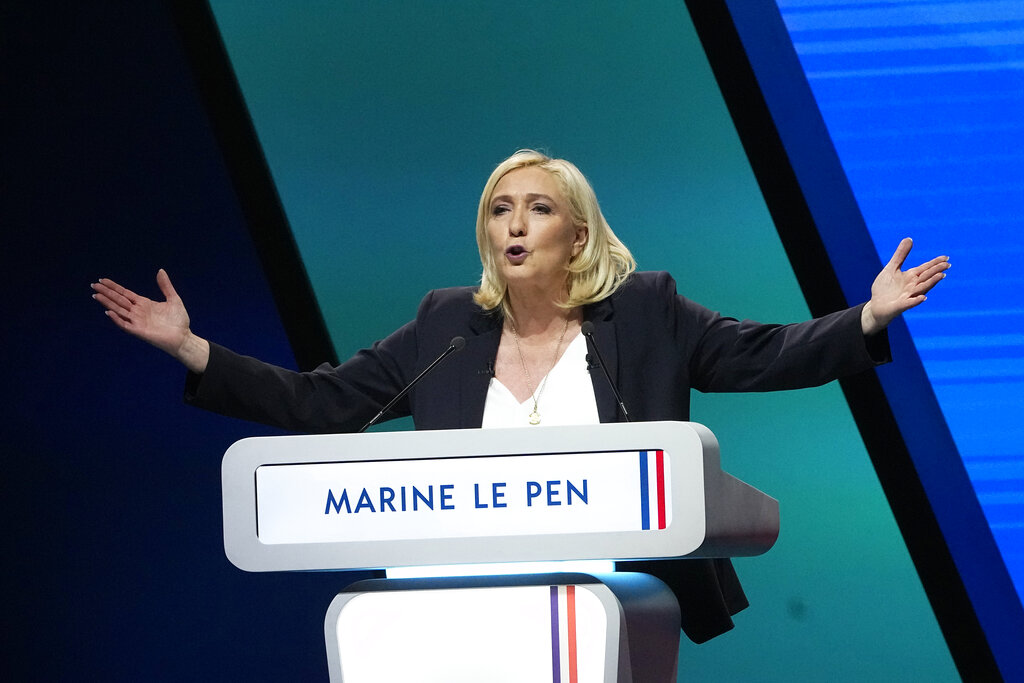If there is one thing most commentators seem to agree on in the aftermath of the first round of the French presidential election, it is that although incumbent President Emmanuel Macron is still the favorite, never before has his rival Marine Le Pen been so close to becoming the president of France.
As a matter of fact, of all the candidates who had a chance to make it to the second round, she is the best placed, with the average of last week’s polls compiled by The Telegraph placing her at 47 percent versus 53 percent against Emmanuel Macron in voting intentions for the second round to be held on Feb. 24.
Had the populist, Islamo-leftist Jean-Luc Mélanchon obtained half a million more votes, Macron was set to win against him with 58 percent of the vote to 42 percent for his rival. The next best-placed potential rival was center-right candidate Valérie Pécresse who could count on 36 percent of the vote in the second round against 64 percent for Macron, and Éric Zemmour was credited with 34 percent of voting intentions to 66 percent for Emmanuel Macron.
On Sunday night, all polls published after it became known who the two front-runners are indicated that the second round would be a close race, with one Ifop Fiducial survey published by the TF1 and LCI TV channels even placing the final result within the margin of error, with only 51 percent for Emmanuel Macron and 49 percent for Marine Le Pen, the survey having been conducted by phone just after 8 p.m. on election day.
With most of Zemmour’s voters intending to vote for Le Pen, it is both Mélenchon’s voters and first round abstentionists who can make a big difference. According to the same Ifop-Fiducial survey, almost a quarter of the 22 percent who voted for him on April 10 intend to opt for Le Pen on April 24, in spite of Mélenchon having called on his voters not to give Le Pen a single vote. One third will vote for Macron.
Many will choose to stay home on voting day. The reason for this is that Mélenchon’s electorate is not only made up of immigrants, of Islamists seeing him as a useful idiot, and of the young urban woke (Mélenchon had by far the best results in immigrant neighborhoods and among voters under 35), but also of people belonging to the traditional social left who will be sensible to Le Pen’s consistency in her will to maintain the French generous welfare state and have the state play a bigger role in the economy.
By French standards, Le Pen is a social-conservative, while Macron is a liberal-progressist.
The social left is the electorate Emmanuel Macron has been trying to address since Monday morning, and one of the first thing he did was to signal his readiness to rethink his plan to raise the retirement age from 62 to 65. After five years as president, France’s liberal, globalist president can hardly be convincing on this ground, and the danger for Macron would be if too many left-wing voters decided not to vote at all in the second round of the election or to just slip a blank or invalid ballot in the ballot box.
Apart from Mélenchon’s 22 percent – and Mélenchon himself has only called on his voters not to vote for Le Pen, falling short of calling on them to vote for Macron – there is some 10 percent of the vote spread between smaller left-wing candidates, including Green candidate Yannick Jadot, who obtained 4.6 percent of the vote on Sunday, and Socialist candidate Anne Hidalgo, who obtained a ridiculous 1.75 percent while being the candidate of a party that ruled France in alternation with the center-right from 1981 to 2017.
The Greens and the Socialist Party will not have their campaign expenses refunded by the state, as parties need to obtain at least 5 percent of the vote to be eligible. A further humiliation for Hidalgo comes from the fact that she obtained 2.1 percent in her city of Paris where she has been mayor since 2014.
This election looks very much like the last nail in the coffin of the two major parties that shared power in France for decades, with Les Républicain’s (LR) candidate Valérie Pécresse coming only fifth with 4.8 percent of the vote. This means that the party of former presidents Jacques Chirac and Nicolas Sarkozy will not receive a refund either, and Pécresse was forced to send a dramatic call for donations on Monday morning to cover those expenses.
According to the earlier mentioned survey, although Pécresse said she would vote for Macron – which is not a surprise despite her earlier turn to the right to support her presidential campaign which many doubted was sincere – 35 percent of her voters intend to vote for Le Pen and 35 percent for Macron, with 30 percent who will not vote at all on April 24.
Apart from being more plausible when talking to the less wealthy, Marine Le Pen can now count on the support of the right-wing conservative leaders who had opted for Zemmour, as not only Éric Zemmour himself has called on voters to vote for her, after having come fourth with only 7.1 percent of the vote, but also Marine Le Pen’s niece Marion Maréchal and the leader of the small Christian Democratic party Via – La Voix du Peuple, Jean-Frédéric Poisson.
Others, like Gaullist presidential candidate Nicolas Dupont-Aignan (who obtained 1.5 percent of the vote) as well as Florian Philippot, who left Le Pen and created his own party in 2017 and lead the protest against health segregation last year, have said they would vote for Marine Le Pen, and a leading conservative figure from Pécresse’s LR party, Éric Ciotti, has also said he would vote against Emmanuel Macron, although the center-right’s official line is to ask its voters not to vote for Le Pen, i.e. either to vote for Macron or to choose abstention.
Even Macron had to acknowledge on Monday that the so-called “Republican Front,” which meant the alliance of all parties against Le Pen and her National Rally (RN), is now dead and buried, and most commentators in France and abroad agree that a victory for Le Pen is now possible. The political divide in France now seems to be between the globalist, progressist, multiculturalist, and eurofederalist on the one side, and the Orbán-style, more conservative “populists” on the other side. And if Macron fails to mobilize the left in his favor, he could very well lose against those he once called the nationalist and populist “leprosy spreading across Europe.”
As a matter of fact, Le Pen’s political program is in many ways reminiscent of the measures taken by the conservative governments of Hungary and Poland, including with her promise to hold a referendum on immigration to circumvent the Constitutional Council’s opposition, as well as the promise to put an end to family reunification for immigrants living in France, which will inevitably cause a conflict with the French constitutional court and the country’s higher administrative court, the Council of State, and also with the European Court of Justice. There is no doubt that her promise to process all asylum procedures outside France will also lead to similar conflicts.
In the sphere of the economy and family policies, Le Pen advocates reducing taxes on energy, and she will introduce an exemption from income tax for all French citizens under 30 years of age, with higher tax exemptions for parents of children and a doubling of the benefits paid to single mothers, an increase in pensions and their indexing to the inflation, the promise not to increase the retirement age (contrary to Macron), new investments in nuclear energy and in the health care system, as well as a return to fundamentals in education with more French, history and math lessons in schools, etc.
As far as France’s foreign policy is concerned, if Le Pen wins the election on April 24, it will probably look more like Hungary’s than Poland’s. On sanctions against Russia, Marine Le Pen supports the existing sanctions but is opposed to any embargo in the energy sector.
In the area of defense, even before the Ukrainian invasion, the RN candidate promised to increase spending and to focus on the national dimension, with a promised exit from NATO’s Integrated Command (which would mean a return to the situation prevailing until 2009), an emphasis on the navy to better protect France’s overseas interests and territories, the abandonment of Franco-German armament programs for future fighter planes and tanks, and the promise to give up the idea of a common European defense within the EU structures and to focus instead on bilateral cooperation with selected EU and non-EU countries.





